Special conditions
Special conditions are applied to certain types of service where the Phone-paid Services Authority is satisfied after public consultation that there is an increased potential for consumer risk, harm or offence. Each Special conditions regimes is unique to the risks presented by the service types and is set out in Notices which can be found on the links below:
- Notice of Special conditions for Broadcast PRS
- Notice of Special conditions for Call TV Quiz services
- Notice of Special conditions for Credit Broking Services
- Notice of Special conditions for Information, Connection and Signposting Services
- Notice of Special conditions for Live Entertainment and Chat Services
- Notice of Special conditions for Online Adult services
- Notice of Special conditions for Online Competition services
- Notice of Special conditions for Pay Per View Services
- Notice of Special conditions for Professional services
- Notice of Special conditions for Recurring Donations
- Notice of Special conditions for Remote Gambling
- Notice of Special conditions for Subscription services
What happens when Special conditions require notification to PSA?
It is important to remember that service registration should always be completed within 48 hours of commencement regardless of the service type, however on top of this some Special conditions require additional information that is not usually mandatory to also be provided.
Providers operating services subject to Special conditions should confirm that they do intend to operate such services and select the relevant service type from list as shown below:
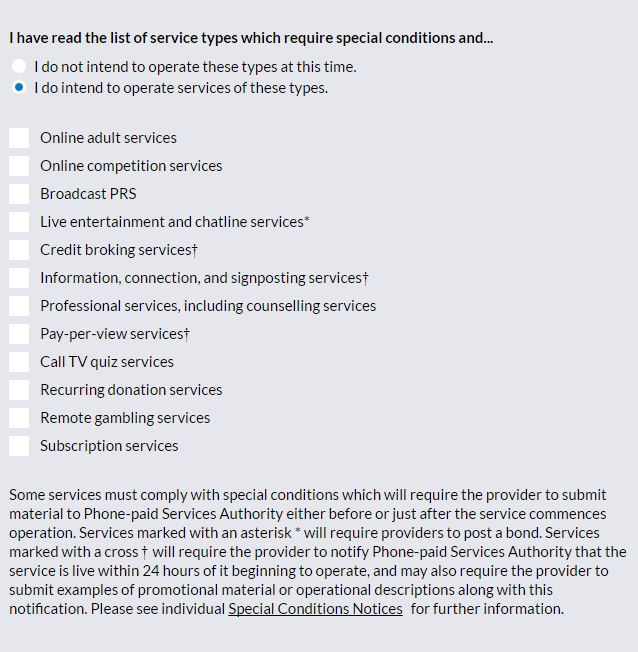
Online adult and online competition services special conditions require providers to register information displayed below in four steps:
1) Customer care services details including phone number and email address:
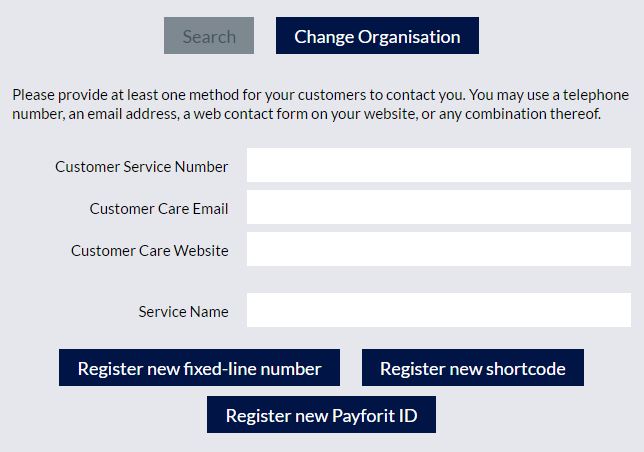
2) After registering PRS numbers providers must also register the dedicated number chosen for STOP and STOP ALL requests, typing “STOP SHORTCODE” in the keyword field:
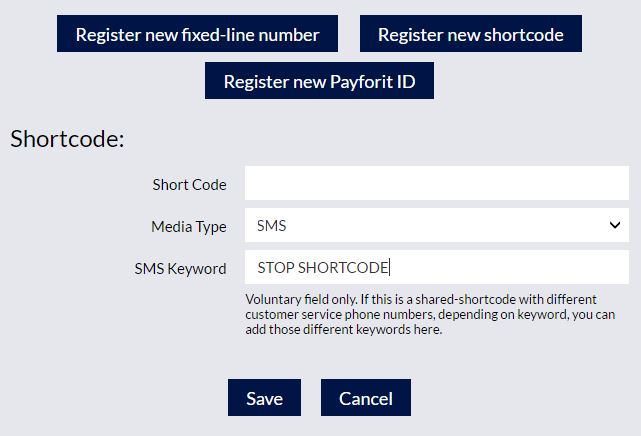
3) The identity of all Level 1 providers involved in the provision of the PRS, including those managing the method of exit:
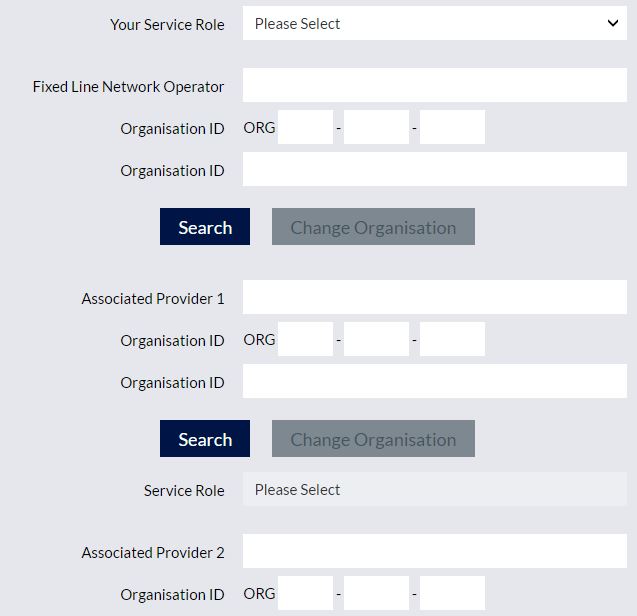
4) Brand identification; it is important to clearly identify each service brand you operate separately. If separate charges are incurred for individual competitions or adult content then each service is a distinct service, but if a charge, or series of recurring charges are incurred for access to multiple competitions or adult content under one brand name then this would be one service:
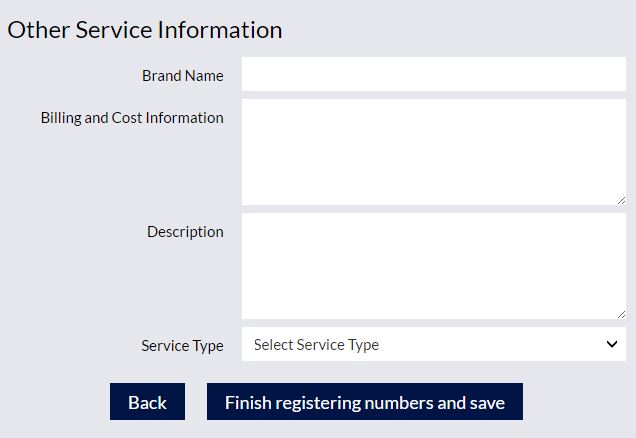
Providers operating services subject to Special conditions should confirm that they do intend to operate such services and select the relevant service type from list as shown below:

Online adult and online competition services special conditions require providers to register information displayed below in four steps:
1) Customer care services details including phone number and email address:

2) After registering PRS numbers providers must also register the dedicated number chosen for STOP and STOP ALL requests, typing “STOP SHORTCODE” in the keyword field:

3) The identity of all Level 1 providers involved in the provision of the PRS, including those managing the method of exit:

4) Brand identification; it is important to clearly identify each service brand you operate separately. If separate charges are incurred for individual competitions or adult content then each service is a distinct service, but if a charge, or series of recurring charges are incurred for access to multiple competitions or adult content under one brand name then this would be one service:

What happens when Special conditions introduce bond arrangements for the purpose of compensation claims?
Under section 3.11 of the Code, we may adopt special conditions which include the imposition of bond arrangements.
Bond arrangements can be put in place for a number of reasons, one of which being for the purposes of financing compensation claims. There are circumstances where we may be required to investigate such claims. Such investigations are not considering specific breaches of the Code. Instead they deal with matters such as unauthorised use of the communications network and whether any particular claim is justified or merely vexatious.
We will follow the procedure set out below when these claims are brought to its attention in accordance with any relevant Notices of Special conditions:
Procedure for compensation claim assessments
1. Currently, live entertainment services and / or chatline services (including multi-party chat) must not be provided unless a bond has been arranged with a third party approved by the Phone-paid Services Authority. This is imposed under Special conditions for such services at LECS14(a) and LECS14(b). Providers of such services are encouraged to contact us to make arrangements for a bond of the correct amount. Please contact our compliance advice team on compliance@psauthority.org.uk.
2. Compensation must be available to any person whose connection to the electronic communications network has been the subject of unauthorised use of the relevant live service(s). Claims for compensation may be made by any person whose connection to the electronic communications network has been the subject of unauthorised use. Claims for compensation may be made directly to providers of relevant services. Where claims are received by the Phone-paid Services Authority, the relevant provider(s) will first be given an opportunity to settle them to the satisfaction of the claimant.
3. Providers must respond to all claims in a timely manner, and LESC14(d) sets a limit of 1 month for investigation of such claims. Following the investigation valid claims must be paid out promptly.
4. LESC14(g) states:
If the relevant provider does not settle to the satisfaction of the claimant within such time as the legally qualified member of the CAP considers reasonable (and which will be notified to the relevant provider), the Executive will investigate the claim and prepare a report which will be promptly passed to that CAP member for adjudication. A copy of the report will be made available to the relevant provider for comment and representation. The CAP member will make an adjudication, after such investigation as he considers appropriate, on the basis of the material in front of him.”
5. An intervention by the Phone-paid Services Authority under the direction of a legally qualified member of the CAP may be appropriate where claimants escalate their claim to Phone-paid Services Authority. An intervention before the end of the 1 month period set out in LECS14(d) may be considered appropriate where there is evidence the provider is not conducting its investigation in a timely manner or where there are unnecessary requests for information made by a provider to a claimant causing undue delay to the process. Where there are concerns, a legally qualified member of the CAP may set a time limit for settlement of claim(s), and this will be notified to the relevant provider.
6. In these circumstances, where the matter is still unresolved, the Executive will conduct its own investigation of the claim and prepare a report for the legally qualified CAP member to consider. The relevant provider will be invited to consider the report and make its own representations in writing. The report and any representations provided for consideration will then be provided to the CAP member for adjudication.
7. Where claims are satisfied without intervention the bond will remain intact. However, claims may be paid out from the bond amount where such an order is made by the CAP member as part of its adjudication of such claims. This will be necessary where cooperation with the claim has not been given by the relevant provider.
8. Directions to make payment in respect of claims will not be published, however, they will be supplied to the relevant provider in writing as soon as possible after the decision has been made, and if a provider is required to cease operation of any relevant services in accordance with LECS14(k) this may be published on our website.
Bond arrangements can be put in place for a number of reasons, one of which being for the purposes of financing compensation claims. There are circumstances where we may be required to investigate such claims. Such investigations are not considering specific breaches of the Code. Instead they deal with matters such as unauthorised use of the communications network and whether any particular claim is justified or merely vexatious.
We will follow the procedure set out below when these claims are brought to its attention in accordance with any relevant Notices of Special conditions:
Procedure for compensation claim assessments
1. Currently, live entertainment services and / or chatline services (including multi-party chat) must not be provided unless a bond has been arranged with a third party approved by the Phone-paid Services Authority. This is imposed under Special conditions for such services at LECS14(a) and LECS14(b). Providers of such services are encouraged to contact us to make arrangements for a bond of the correct amount. Please contact our compliance advice team on compliance@psauthority.org.uk.
2. Compensation must be available to any person whose connection to the electronic communications network has been the subject of unauthorised use of the relevant live service(s). Claims for compensation may be made by any person whose connection to the electronic communications network has been the subject of unauthorised use. Claims for compensation may be made directly to providers of relevant services. Where claims are received by the Phone-paid Services Authority, the relevant provider(s) will first be given an opportunity to settle them to the satisfaction of the claimant.
3. Providers must respond to all claims in a timely manner, and LESC14(d) sets a limit of 1 month for investigation of such claims. Following the investigation valid claims must be paid out promptly.
4. LESC14(g) states:
If the relevant provider does not settle to the satisfaction of the claimant within such time as the legally qualified member of the CAP considers reasonable (and which will be notified to the relevant provider), the Executive will investigate the claim and prepare a report which will be promptly passed to that CAP member for adjudication. A copy of the report will be made available to the relevant provider for comment and representation. The CAP member will make an adjudication, after such investigation as he considers appropriate, on the basis of the material in front of him.”
5. An intervention by the Phone-paid Services Authority under the direction of a legally qualified member of the CAP may be appropriate where claimants escalate their claim to Phone-paid Services Authority. An intervention before the end of the 1 month period set out in LECS14(d) may be considered appropriate where there is evidence the provider is not conducting its investigation in a timely manner or where there are unnecessary requests for information made by a provider to a claimant causing undue delay to the process. Where there are concerns, a legally qualified member of the CAP may set a time limit for settlement of claim(s), and this will be notified to the relevant provider.
6. In these circumstances, where the matter is still unresolved, the Executive will conduct its own investigation of the claim and prepare a report for the legally qualified CAP member to consider. The relevant provider will be invited to consider the report and make its own representations in writing. The report and any representations provided for consideration will then be provided to the CAP member for adjudication.
7. Where claims are satisfied without intervention the bond will remain intact. However, claims may be paid out from the bond amount where such an order is made by the CAP member as part of its adjudication of such claims. This will be necessary where cooperation with the claim has not been given by the relevant provider.
8. Directions to make payment in respect of claims will not be published, however, they will be supplied to the relevant provider in writing as soon as possible after the decision has been made, and if a provider is required to cease operation of any relevant services in accordance with LECS14(k) this may be published on our website.
